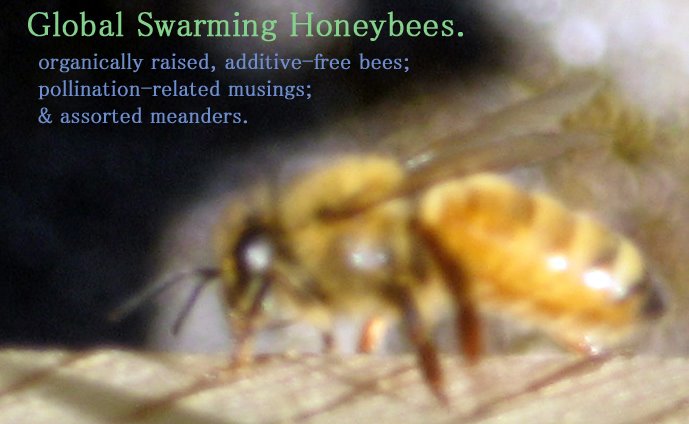I came upon a beautifully written treatise on sustainable beekeeping last evening. The author, Phil Chandler, articulates better than I ever could some of the thinking behind beekeeping off the chemical grid, as it were. If you're thinking about taking up beekeeping, or interested in understanding the context for the current honeybee crisis, I highly recommend it.
Commercial and mainstream beekeeping is pumping bees full of antibiotics and chemicals, essentially breeding weaker bees with no chance of developing natural resistance to pests and diseases. This growing weakness is, of course, met with more chemicals and man-made "solutions" that are lucrative for certain humans and devastating for bees, our environment, and our already corrupted relationship to our brethren in the natural world.
In addition, our pollination practices undermine bees' nutritional needs, forcing them to collect monolithic nectar sources by treating them as pollination machines. One illustration: the underbrush of almond orchards is assiduously mowed to prevent other blossoms from "distracting" the bees from their (forcibly) assigned task, meaning that they have no choice but to collect nectar and pollen from a single plant: almond. In nature, bees visit a diversity of blossoms to ensure a rich variety of nutritional inputs.
These are just a couple of quick illustrations of how we're screwing, and screwing up, the bees.
There are alternatives, though you'd never, ever know it from reading the beekeeping books out there. It's a bit like the myth that organic farming is somehow less efficient or productive than dousing our food supply with chemicals, trashing the health of the topsoil, and wrecking the ecosystem to "manufacture" bright and pretty (and pretty tasteless) tomatoes, strawberries, or watermelons, in and out of season. There's a new report showing that organic farming more than holds its own against conventional farming practices. It's worth a look.
7.12.2007
Thoughts On Sustainability
Labels:
beekeeping,
pollinators,
R-E-S-P-E-C-T,
sustainability
Subscribe to:
Post Comments (Atom)






No comments:
Post a Comment